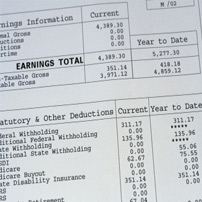South Jersey Employment Lawyers: Bill to Require Additional Information on Pay Stubs
May 5, 2017 In March 2017, the New Jersey Assembly Labor Committee voted in favor of amending the current state wage notification requirements for public and private sector employers. The bill, A-4245, will require employers to provide their employees with statements of their gross wages, net wages, deductions, rate of pay, and hours worked during the pay period with each pay stub. Currently, employers are only required to state the deductions made each pay period on pay stubs issued. This requirement will cover all pay stubs issued to hourly employees as well as nonexempt employees who earn salaries, commissions, or are otherwise not paid an hourly pay rate.
In March 2017, the New Jersey Assembly Labor Committee voted in favor of amending the current state wage notification requirements for public and private sector employers. The bill, A-4245, will require employers to provide their employees with statements of their gross wages, net wages, deductions, rate of pay, and hours worked during the pay period with each pay stub. Currently, employers are only required to state the deductions made each pay period on pay stubs issued. This requirement will cover all pay stubs issued to hourly employees as well as nonexempt employees who earn salaries, commissions, or are otherwise not paid an hourly pay rate.
The purpose of this bill is to make it possible for employees to calculate exactly how their net earnings are reached. This can make it easier to spot discrepancies between stated and actual rates of pay and help employees determine if they do not receive the overtime pay they are entitled to receive for hours worked beyond a standard 40-hour workweek as required by the Fair Labor Standards Act (FLSA).
New Jersey’s Current Wage and Hour Requirements
Employers are required to pay their employees at least the state minimum wage of $8.44 per hour. There are a few exceptions to this requirement, such as tipped employees who must receive at least $2.13 per hour, the federal minimum wage for tipped workers. Even these individuals must make at least the federal minimum wage of $7.25 per hour and if their tips do not equate this, the employer must make up the difference between the worker’s actual earnings and the federal minimum wage.
Most employees also must be paid one and one half times their hourly wage for every hour worked beyond 40 hours within a seven-day period. Exceptions to this rule include individuals in certain seasonal professions, such as entertainment and farm workers, and highly-compensated employees who regularly perform executive or administrative roles.
New Bill to Increase Employer Accountability
Sometimes, employees do not receive the payment they earn due to clerical errors. The employer might have an incorrect pay rate entered for that employee or they might miscalculate the number of hours the employee worked, resulting in an incorrect payment. In other cases, these and other actions are taken to purposely save money. For example, an employer might require an employee to continue to perform job tasks after clocking out for the day, which can keep the employee’s hours low enough to keep them from receiving overtime pay.
This law cannot prevent employers from committing wage and hour violations, but it will give employees greater recourse in the event they are victims of such violations. With documentation of their pay rates and related calculations in hand, it will be easier for wronged employees to present the evidence necessary to correct wage and hour violations.
South Jersey Employment Lawyers at Sidney L. Gold & Associates P.C. Represent Workers Whose Rights are Violated
If your employer is not in compliance with current state and/or federal employment laws, your rights could be being violated. To learn more about how employer noncompliance affects you and other employees, fill out our online form or call 215-569-1999 to schedule your legal consultation with a South Jersey employment lawyer at Sidney L. Gold & Associates P.C. Our office is located in Philadelphia and we work with clients throughout Pennsylvania and New Jersey.





























